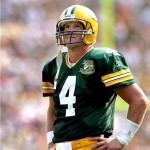When Athletes Can't Say Goodbye
 Barring a miracle, the end has finally come for Brett Favre. Why is it so difficult for athletes like him to walk away at the end of their careers?
Barring a miracle, the end has finally come for Brett Favre. Why is it so difficult for athletes like him to walk away at the end of their careers?
Barring a miracle, the end has finally come for Brett Favre. If his multiple retirements and comebacks over the last few years haven’t tarnished his reputation, they certainly produced heapings of abuse. Talk about a guy who couldn’t leave the limelight. Having achieved everything possible, and with induction to the Hall of Fame just a matter of time, why in the world did he need to keep putting his battered body in harm’s way, accomplishing nothing and risking injury that could adversely affect the rest of his life?
The nadir was the bitter end, that frigid Monday night in Minnesota. Just a week earlier, his streak of 297 consecutive games was broken on account of a lump the size of a golf ball between his shoulder and neck. With that and various other injuries unhealed, the Vikings out of contention for a playoff spot, and nightmarish playing conditions, the 41-year old nevertheless dragged himself out there one more time. Early in the game came the sad if predictable ending – Favre, slammed to the ground, suffered a career-ending concussion.
It was crazy that Favre played that day, unfortunate that he played this season at all. And yet, much of the criticism leveled at him, the insults literally added to injuries, was unfair. After all, it’s an old story. The poet Hausman captured it in “To an Athlete Dying Young,” recognizing the pain of “runners whom renown outran.” That was a half-century before Willie Mays, Kareem Abdul Jabbar and virtually every gifted prizefighter hung on well past the point of rationality.
It’s easy to mock the whole lot of them, but only if we don’t take Hausman seriously, if we think it’s easy to walk away. Ball Four recounted in diary form a season in which Jim Bouton, an aging veteran, clung to the major leagues. In a review, Roger Kahn wrote: “It is something to cry about, being an athlete who does not die young.” In I’m Glad You Didn’t Take It Personally, his sequel to Ball Four, Bouton quoted Kahn and skewered him:
All I could think was, bullshit. Only a man who never played the game could have written that line. It’s fake, like the men who cry when they can no longer play baseball are fake. You can miss baseball all right, but you can’t miss it that much. You can’t, you don’t believe your life ends when you stop playing a game. . . . When the time comes you have to be able to walk away from it.
Pretty strong stuff. Except there was another sequel. At the age of 37, and out of baseball for seven years, Bouton attempted a comeback. Far from a harmless mid-life lark, he seemed caught in an obsession. When maverick owner Bill Veeck gave him a spot on his Double A club, Bouton moved his family from New Jersey to Tennessee for the summer. When he lost his first six games and was released, he scoured the country for another team that would give him a chance. Finding no takers, he went to Mexico for a season. Later he hooked up with an independent Class A team in Oregon and rediscovered the pleasure of 14 hour bus rides and greasy burgers.
Amazingly, Bouton eventually made it back to the majors and pitched a few games for the Atlanta Braves before calling it quits. By then, his family was broke and his marriage on the way out. Bouton should have known better than to hammer Roger Kahn over the athlete dying young. After all, he’d ended Ball Four as follows: “You spend a long time gripping a ball and it turns out it’s the other way around.”
To attack Brett Favre is to blame the victim. But it’s important to realize that Favre was victim of more than his own insatiable urges. I can understand why he wanted to play in the blizzard in Minnesota – athletes are like that. But what were the Vikings management and coaches thinking? What was the NBC studio crew thinking? They couldn’t praise the old warrior enough, and neglected to remark the obvious folly of his last stand.
Actually, we know what they were thinking. They stood to gain some small benefit -- a possible victory for the Vikings, a spike in ratings for NBC -- and Brett Favre’s pain didn’t hurt them at all.